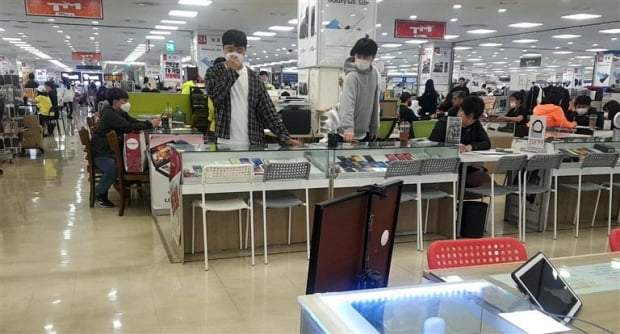Non-face-to-face opening spread after Corona 19
Appearance of unmanned stores, high monthly rent

Sindorim Techno Mart, Guro-dong, Seoul. Photo = Hankyung DB
“I started the business because it was the era of one cell phone per person, but it was poison that I ran into it easily. I wonder if I should close my business.”
On the afternoon of the 23rd, Mr. A, who runs a cell phone store in Guro-gu, Seoul, sighed, saying, “Recent sales have dropped to less than a third of the usual amount.” It’s a weekday lunchtime rental, so it’s time to get a lot of customers, but there weren’t any visitors except for one employee in the store. There were no visitors after lunch break at 2~3 pm. Mr. A said, “Only one opened yesterday at 5 pm,” he said. “The situation is not easy enough that even acquaintances who opened a store at a similar time will be on the verge of closing business in two months.”
Recently, cell phone stores are virtually’closed’. Last year, due to the spread of the new coronavirus infection (Corona 19), the number of visitors was reduced and was hit directly. In particular, as online demand has increased due to the recent non-face-to-face opening and self-sufficiency phone craze, offline stores have cut off customers.

A cell phone store in Yongsan Electronics Shopping Center in Seoul. Photo = Reporter Kim Beom-jun [email protected]
“If the business is closed, it will be less than the statistics of cell phone stores”
According to the mobile communication industry on the 24th, the number of mobile phone stores is on a continuous decline. According to the National Mobile Telecommunications Distribution Association (KMDA) and the industry, the number of mobile phone retailers that reached 20,000 before the enforcement of the Terminal Distribution Structure Improvement Act (Simple Communication Act) in 2014 has now decreased to around 12,000.
The mobile phone store is a store that has signed a contract with an agency managed by a mobile operator, and handles all terminals such as SK Telecom, KT, and LG Uplus, not specific carriers. Mobile phone dealerships are structured to charge about 7% of subscriber fees as well as sales fees when opening a visitor’s mobile phone at each branch. The dealership is operated in such a way that when it is entrusted by an agency to attract subscribers, it receives a commission for activation.
Retailers do not receive support from the mobile operator’s headquarters, and the burden of input capital and store maintenance costs is low. Cell phone stores that once enjoyed a boom have recently been hit by Corona 19 and the business environment is getting worse.
It is also difficult to afford the rent because the location of the store is located on the side of the street or in the’Yolunjawi’ where there is a large floating population. An employee of a mobile phone store said, “If you look at empty stores on the street, most of them are restaurants or mobile phone stores.”
Decreased position due to the appearance of unmanned mobile phone stores
Another reason for the decline in sales of mobile phone stores is that online channels are rapidly rising as the self-sufficiency market has recently attracted attention. As the non-face-to-face demand to browse terminals online and purchase by comparing subscription conditions has increased significantly, mobile phone sales are also shifting from offline to online.
An official from a mobile operator said, “Recently, most of the consumers use online channels,” he said. “Users are increasing rapidly because they can check terminal performance at online stores and receive same-day delivery benefits on the day of opening.”
In fact, mobile carriers are continuously strengthening online sales channels as the non-face-to-face self-sufficiency market has recently grown. Last year, they applied for a temporary permission for a regulatory sandbox from the Ministry of Science, ICT, and ICT to provide a non-face-to-face mobile communication subscription service. KT formed a consortium with SPage Five and Kakao Pay in June of last year to obtain temporary permission, and LG U+ and SK Telecom also received temporary permission through complex identity authentication technology such as the PASS app in September and November, respectively. .
In the mobile phone distribution industry, there is a growing concern over the emergence of unmanned stores operated directly by mobile operators. As the final purpose of these stores is to attract subscribers, the stores are inevitably cut down. An official from the National Mobile Telecommunications Distribution Association said, “While the number of mobile phone dealerships has been insignificant, the number of stores has recently decreased by nearly 40%.” “I said.
Reporter Joara Hankyung.com [email protected]
